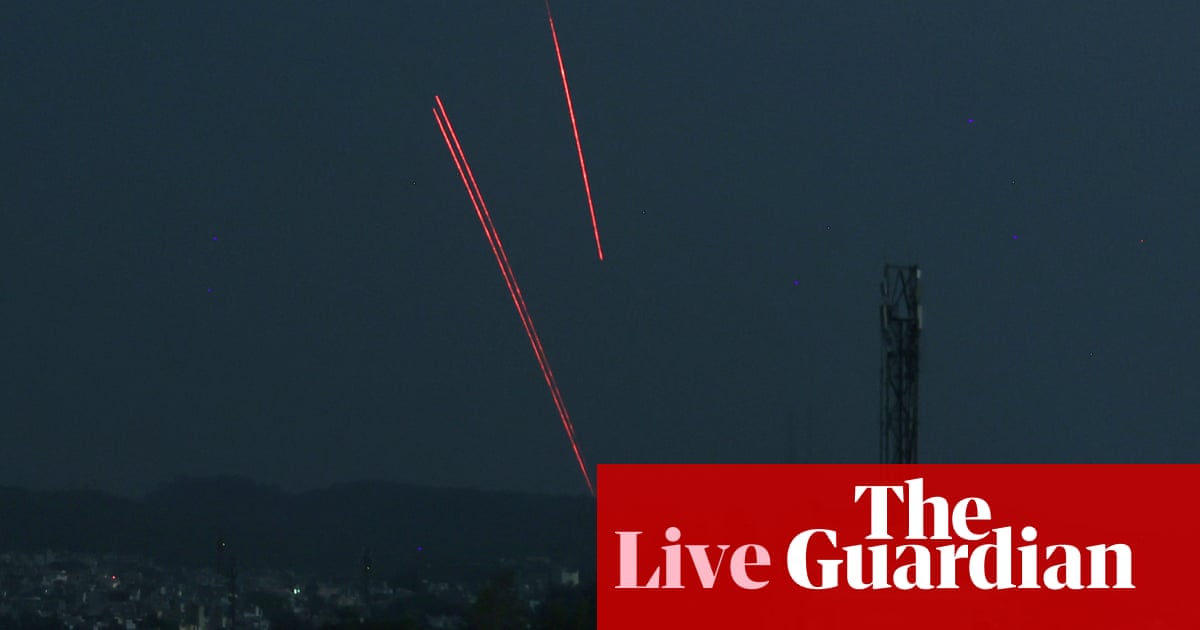The Trump administration’s evisceration of US overseas aid has been presided over by a campaign ally who sowed a trail of enmity at multiple agencies during the first Trump presidency and has been publicly identified as allegedly having been present at the January 6 insurrection when rioters stormed the Capitol.
Peter Marocco has accumulated power in the office of foreign assistance, informally called “F”, that traditionally has helped coordinate US foreign aid programs. But under Marocco, it has enforced a full-scale freeze on overseas aid and a stop-work order that has in effect halted operations and already led to hundreds of layoffs in the United States and overseas.
According to current and former USAid and state department officials, the office’s consolidation of power under Marocco has undermined congressional checks and balances and instead given authority to a non-Senate-confirmed appointee who is slashing and burning his way through overseas aid programs at USAid and the state department.
“He is not a disruptor. He’s a destroyer,” said a former USAid official, who like others spoke on the condition of anonymity to discuss Marocco. “And it’s clear to me. The plan is to come in, destroy USAid, take it down, and then build it up again, the way they want to do that.”
Marocco’s return to USAid has not been formally announced and the department website still lists a previous director for the office of foreign assistance. Many staff only learned that Marocco had been appointed from emails and cables drafted by him ordering them to stop work.
On Friday evening, senior Senate Democrats warned that the Trump administration’s decisions to place senior USAid officials on leave and freeze foreign assistance without engaging with Congress “have created a maelstrom of problems that have put our nation at risk and undermined American credibility around the globe”.
They warned Trump away from reported plans to downsize or even subsume the agency into the state department. “It is imperative that we maintain an independent development voice and capability within the US government,” wrote the senators. “USAid is, by statute, an independent establishment outside of the State Department. Any proposal to modify that structure would require an Act of Congress.”
A former marine and conservative activist from Dallas, Marocco served short stints of just a year each at the state department, commerce department, defense department and USAid during the first Trump presidency. In 2020, a 13-page complaint by USAid staffers was placed in its dissent channel – a framework for foreign service staff to express constructive criticism – accusing Marocco of undermining and micromanaging employees in a way that “rapidly degraded” a small department focused on political transitions. Critics say he is now applying the same playbook of laborious reviews and vague directives to all of USAid.
Marocco was also allegedly photographed and filmed inside the Capitol building during the January 6 riots, according to volunteer activists who have posted a widely cited investigation. Marocco has not been charged with a crime. Asked about the allegation by D Magazine, Marocco did not address whether he had been at the Capitol, but described it as “petty smear tactics and desperate personal attacks”.
He joined Trump’s transition team in December as an adviser on national security personnel matters.
“Democrats and their allies in the media who think they are going to obstruct our ability to deliver on this mandate by going back to the same January 6 playbook of smears and faux outrage that was soundly rejected by the American people will be disappointed,” Trump’s spokesperson, Karoline Leavitt, told Politico at the time.
The state department declined to respond to questions regarding Marocco’s appointment, his alleged participation in the events of 6 January 2021, and the department’s review process for evaluating overseas aid and potential waivers to the program.
Former and current officials at USAid, the state department and the Department of Defense told the Guardian that Marocco’s previous stints at those agencies had been characterized by secrecy, personal conflicts and arbitrary rules meant to hobble the bureaucracy. Some said they believed Marocco had returned to take revenge on his former colleagues.
“The reaction was recoil and horror,” said a former senior USAid official regarding Marocco’s appointment. “I don’t know if they really believe in development or humanitarian assistance unless it’s transactional.”
“He’s the most unqualified person to be sitting in any seat of government, let alone the person who has the keys to our foreign assistance,” said another former colleague who still works at USAid.
Marocco strode into the offices of USAid this week flanked by members of Elon Musk’s “department of government efficiency”, a special group Trump created, with clipboards in hand. Several hours later, almost 60 senior officials from the office had been put on paid leave. Veteran aid officials with decades of experience at the agency were escorted from the building by security, according to current and former USAid officials, and their email accounts were frozen.
“They wanted to decapitate the organisation,” said a current USAid employee. “And they did it by pushing aside the leadership and decades of experience.”
The purge followed confusion within USAid over the stop-work orders drafted by Marocco and signed by Marco Rubio, the new secretary of state, leading some to believe that limited actions could continue if funds had already been committed.
“We have identified several actions within USAid that appear to be designed to circumvent the president’s executive orders and the mandate from the American people,” wrote Jason Gray, USAid’s acting administrator, saying the relevant staff would be put on administrative leave.
Some employees have openly rebelled. In an email to all staff seen by the Guardian, Nicholas Gottlieb, USAid’s director of employee and labor relations, said that appointees at USAid and “Doge” had “instructed me to violate the due process of our employees by issuing immediate termination notices”.
Calling the requests “illegal”, Gottlieb said he “will not be a party to a violation of [due process]”. Hours later, he was put on administrative leave.
In a separate email to the sidelined USAid senior staff, Gottlieb wrote that the “materials show no evidence that you engaged in misconduct”.
after newsletter promotion
“I wish you all the best – you do not deserve this,” he wrote.
The chaotic rollout of the ban has led to whiplash for critical programs around the world, from emergency Aids relief (which has been granted a waiver), to clean-water and sanitation programs, to the Famine Early Warning Systems Network, which the Washington Post reported on Friday had gone offline.
Yet there are few details of a vast review program, which is supposed to evaluate thousands of foreign aid grants as well as an expected torrent of waiver requests. And a number of the senior USAid staff put on administrative leave were lawyers who had helped prepare requests for exemptions from the foreign aid freeze, sources said.
The state department has said the waiver process has been used “successfully dozens of times in the first several days alone; however, many requests failed to provide the level of detail necessary to allow a thorough evaluation”.
Previous cables indicated that the people involved would include Marocco or the new director of policy planning, Michael Anton, another political appointee. The state department declined to answer questions from the Guardian about who is evaluating the reviews and how many staff had been detailed to the process.
“The lack of clarity on the waivers has been a huge problem for partners,” said one current USAid official. “When it comes to USAid-funded programs, there’s, like, crickets. No one’s been able to get information.”
Insiders have told the Guardian that Marocco has sidelined career staff at the office of foreign assistance and that just a few employees had been brought in to work on evaluating the programs. Waiver requests to USAid are being sent to Marocco’s office of foreign assistance, from where they’re forwarded to the policy planning staff, which has recently suspended all of its career civil servants and foreign service officers, leaving only political appointees to review them.
“We’re all trying to figure out, is there a review process? Who’s part of that review?” said the former senior USAid official. “Is it Pete Marocco and his two best friends?”
At USAid, other directives have been enacted that have both defunded and demoralised staff. Photographs of aid programs around the world have been literally stripped off the walls after a “directive has been issued to remove all artwork and photographs from the offices and common spaces across all buildings”.
“Now all the pictures have to come down and I go: ‘Oh, good. Are we going to burn books next?’” said one current USAid employee.
Musk’s “efficiency department” has crowed about slashing $45m in scholarships for students from authoritarian Burma.
The $40bn a year that the US spends on foreign aid is less than 1% of its budget. But the US spends $4 out of every $10 spent globally on humanitarian aid, according to the state department, and the sudden cutoff has led to thousands of layoffs among US contractors and local partners around the world.
“Got that late Friday,” said one implementer, an American citizen, who received a stop-work order seen by the Guardian. “And was fired on Monday as a result.”
The 90-day stop-work order and financial freeze meant that there was no one to actually prepare the waiver request, that person said.
Devex, a media platform for news on the development community, reported this week that USAid’s Bureau for Humanitarian Assistance had also furloughed about 500 institutional support contractors, or 40% of its team, undercutting its ability to react quickly to a humanitarian crisis.
A former USAid official said the decisions could put millions of people around the world at risk.
“If there’s a tropical cyclone that hits Cox’s Bazar tomorrow, then how are you going to save all those people, and then how are you going to rebuild if there’s a stop-work order?” said a former senior USAid official, referring to the city in Bangladesh where more than 1 million Rohingya refugees are living. “You could have people sitting there for 90 days and sitting and waiting for what? That’s what worries more.”

 3 months ago
53
3 months ago
53













































